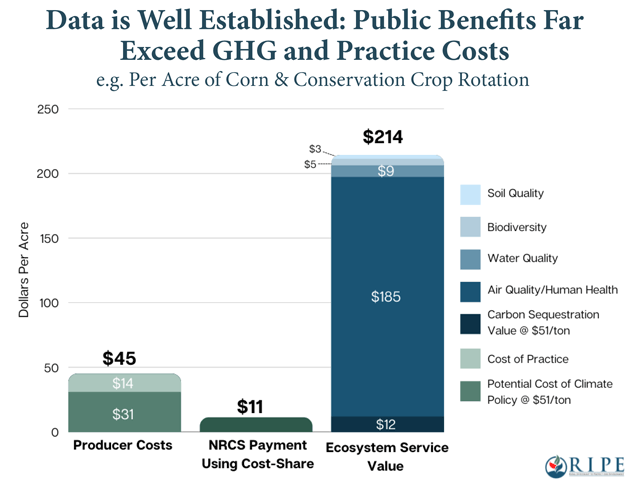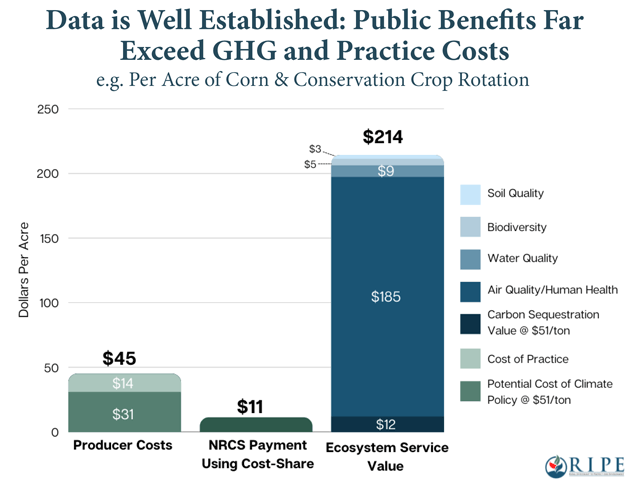Ag Policy Blog
RIPE Pitches Higher Conservation/Climate Payments in Next Farm Bill
A farmer-led group that formed about a year ago, the Rural Investment to Protect our Environment (RIPE), released a 2023 farm-bill proposal looking to increase conservation and streamline the process for producers to enroll.
RIPE came out last year championing a conservation program that would pay farmers $100 per acres or animal unit for their stewardship work.
In their farm-bill policy platform, RIPE and its board members want Congress to take a look at $18 billion that was part of the Inflation Reduction Act (IRA) for conservation programs and change the payment formula for programs such as the Environmental Quality Incentives Program (EQIP) and Conservation Stewardship Program (CSP).
The IRA set aside $8.45 billion for EQIP; $3.25 billion for CSP; $4.95 billion for the Regional Conservation Partnership Program (RCPP); and $1.4 billion for the Agricultural Conservation Easement Program (ACEP).
Another $1 billion will go to the Natural Resources Conservation Service (NRCS) for technical assistance as well.
Under the IRA, the funds set aside in each program must help lower carbon emissions from agriculture or sequester carbon.
P[L1] D[0x0] M[300x250] OOP[F] ADUNIT[] T[]
RIPE wants other farm organizations to consider that a portion of the IRA funds should be invested in a new conservation program that provides a simple enrollment process and includes early adopters of certain conservation practices that will enable them "to earn equitable payments above implementation costs (and) economic losses during transition to new practices and future climate policy costs."
RIPE maintains the current payments under conservation practices are below the costs of implementing new practices and do not adequately compensate farmers for all of the environmental benefits to society.
RIPE's analysis cites the "potential cost of climate policy" at $51 a ton, which translates into $31 an acre. Along with costs to implement practices, $14 an acre, RIPE estimates farmer costs at $45 an acre while average NRCS cost-share is $11 an acre.
The group also cites the benefits to air quality and human health at $185 per acre. Combined with other factors, RIPE then pegs the ecosystem services value stream for society as high as $214 an acre.
RIPE notes that a poll in 2021 cited 78% of farmers prefer payments for soil, water and carbon rather than simply payments for carbon. And 76% of farmers in the same survey support a climate policy with $100 per-acre payments for voluntary conservation practices.
Under its proposal, the USDA secretary would set payment rates that at least have a floor greater than the implementation cots as well as costs of climate legislation or regulations. Payments would consider "increased economic risks," as well as anticipated yield loss and economic losses when transitioning to new practices.
RIPE has a steering committee from groups including Arkansas Rice, Georgia Organics, Minnesota Farmers Union, Minnesota State Cattlemen's Association, the National Black Growers Council, North Dakota Farmers Union, the North Dakota Grain Growers Association, National Latino Farmers & Ranchers and the National Sorghum Producers.
Some farmers who serve in their personal capacity include Brad Doyle of Arkansas; Brandon Hunnicut of Nebraska; Fred Yoder of Ohio; and Jimmy Emmons of Oklahoma.
More details on RIPE and its proposal can be found at www.riperoadmap.org
Article last year "Group Wants New Conservation Program," https://www.dtnpf.com/…
Chris Clayton can be reached at Chris.Clayton@dtn.com
Follow him on Twitter @ChrisClaytonDTN
(c) Copyright 2022 DTN, LLC. All rights reserved.






Comments
To comment, please Log In or Join our Community .